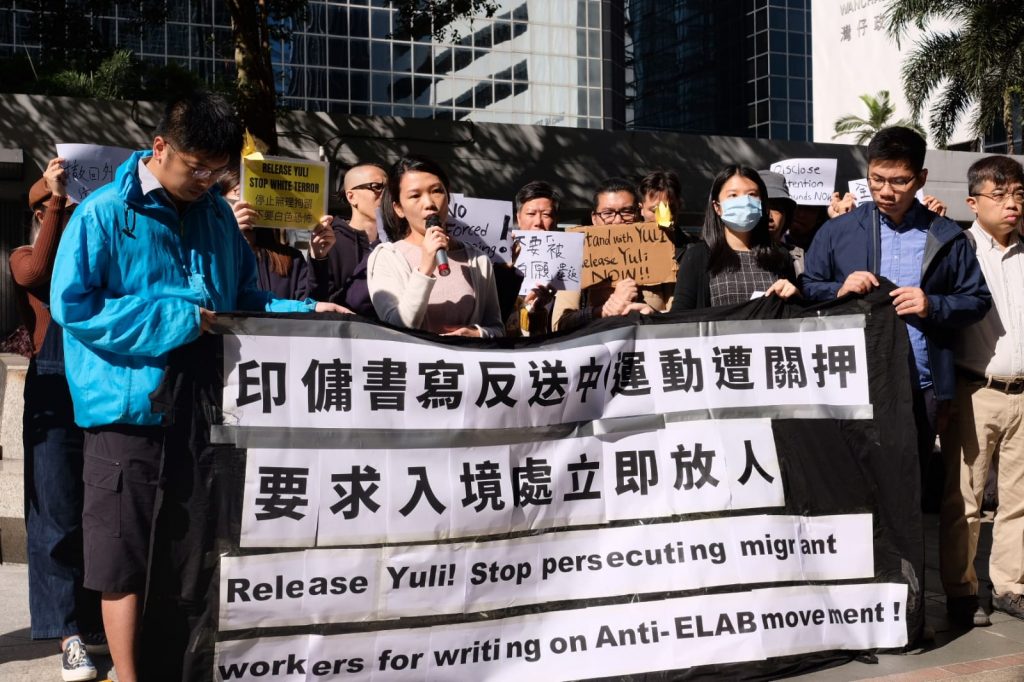Yuli Riswati, an award-winning Indonesian reporter and migrant domestic worker who has played a vital role in documenting Hong Kong’s ongoing political crisis, has been deported by Hong Kong immigration authorities this afternoon under the pretext of an unrenewed work visa, following an inhumane detention of 28 days. Her circumstances are a reminder of the many forms of state violence faced by migrant domestic workers in Hong Kong—and all Hongkongers should take notice.
Yuli—who has lived in Hong Kong for ten years—has paid close attention to the unfolding of this year’s movement from its very start. Realizing that many workers were not well-informed about the protests, owing to a lack of coverage in Bahasa Indonesia, she took it upon herself to interview demonstrators, take pictures of actions, and translate local news into Bahasa Indonesia. Her work has been published in Migran Pos and Suara. As she has explained, her goal was to inform her compatriots about the movement, so they could get around the unintended disturbances caused by protest actions, and would not be misled by biased or false reporting.
The circumstances under which Yuli was deported are highly unusual, and without a doubt politically motivated. After signing a two-year employment contract earlier this year, Yuli renewed her passport but did not renew her visa. According to the Hong Kong Federation of Asian Domestic Workers Unions (FADWU), this common situation is usually resolved when the employer confirms that the worker is still employed in a letter to the Immigration Department. In almost all cases, workers are able to get their visas renewed without hassle so long as the migrant worker is under contract. Instead, Yuli was arrested at her workplace, intimidated by officers to cancel her work visa, and detained without medical attention despite her employer’s legal appeals—in a clear demonstration of the Immigration Department’s unregulated executive overreach.

Yuli has also faced harassment from the public for her work: she has been falsely accused of encouraging workers to “report” on employers who have participated in this year’s protests. One protester confronted her as she photographed a rally, saying: “You’re an Indonesian worker, you’re not supposed to be doing this!” Despite this, Yuli has remained committed to informing Indonesians and showing solidarity with the movement through her reporting.
We must not let her efforts—or the cruel and unjust punishment she has received as a consequence—become a mere footnote in Hong Kong’s struggle for liberation. The use of executive and administrative instruments to suppress political dissent is exactly what our movement is fighting against, and standing with Yuli is part of that fight.
Many migrant domestic workers, whose crucial care work and reproductive labour are underpaid and underappreciated, face the violence of Hong Kong government’s border enforcement. This takes many forms, from the “live-in policy” and the “two-week rule” to the kind of political suppression directed at Yuli. Migrant domestic workers share experiences of structural violence with protesters met with police brutality, children facing ostracization by their families, and contract cleaners forced to work under dangerous circumstances without safeguards.
The detention and deportation of Yuli—as well as the inhumane treatment she has faced inside Castle Peak Bay Immigration Centre—is not an isolated injustice. Rather, it is indicative of how the laws governing Hong Kong’s migrant workers are stacked against them, and how the Immigration Department abuses its power to serve the government’s political objectives. It should prompt us to thoroughly consider what our city owes migrant domestic workers and how we must be vigilant in demanding accountability: from not only the police, but also the immigration system.
Yuli stood with Hongkongers’ fledgling struggle for liberation. It’s time for us to show our solidarity with her by fighting for a Hong Kong where all migrant workers are treated fairly and with dignity.





